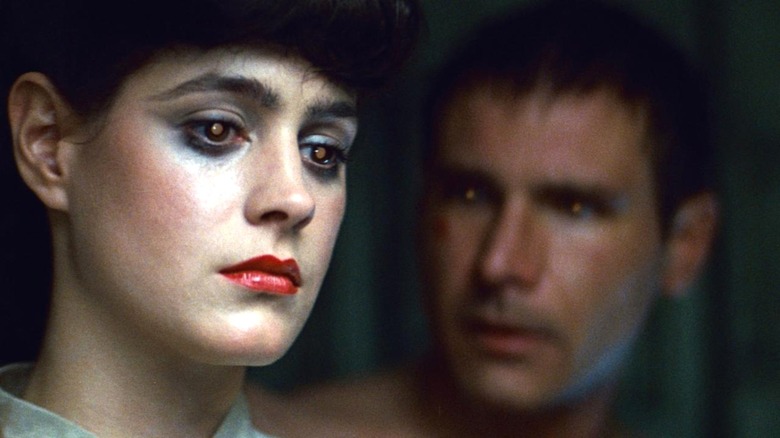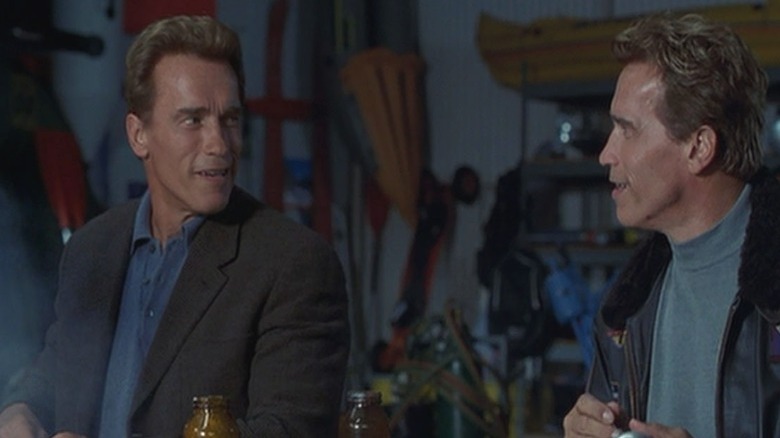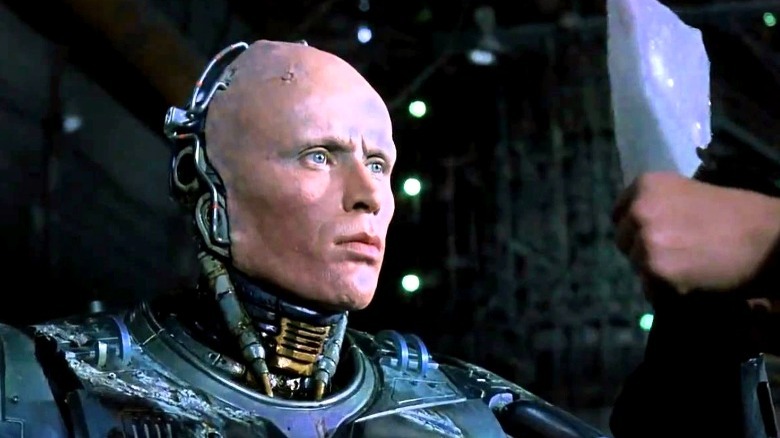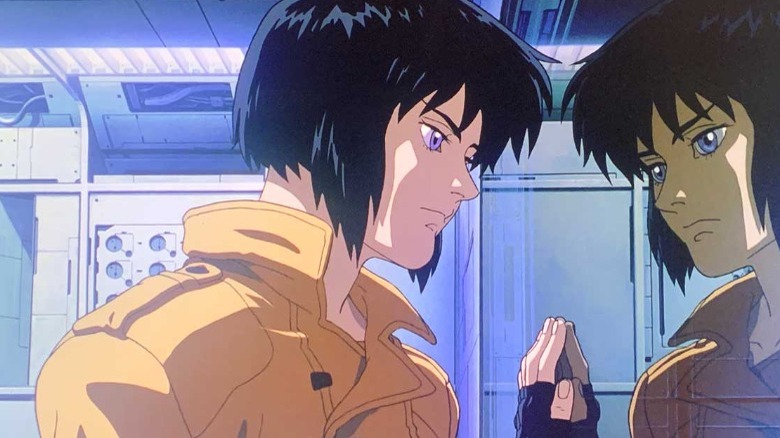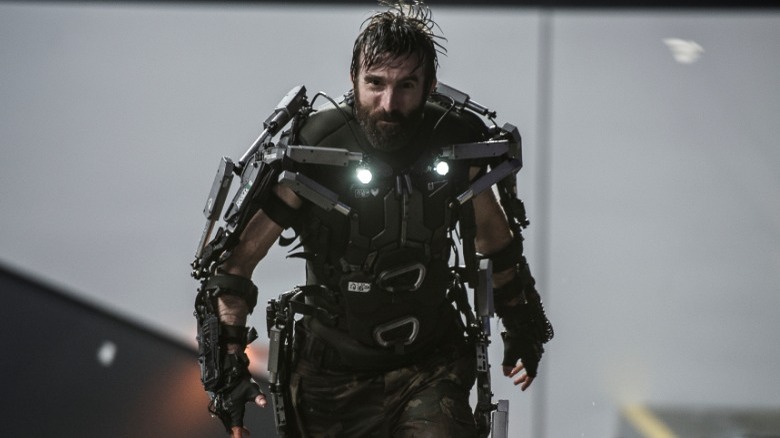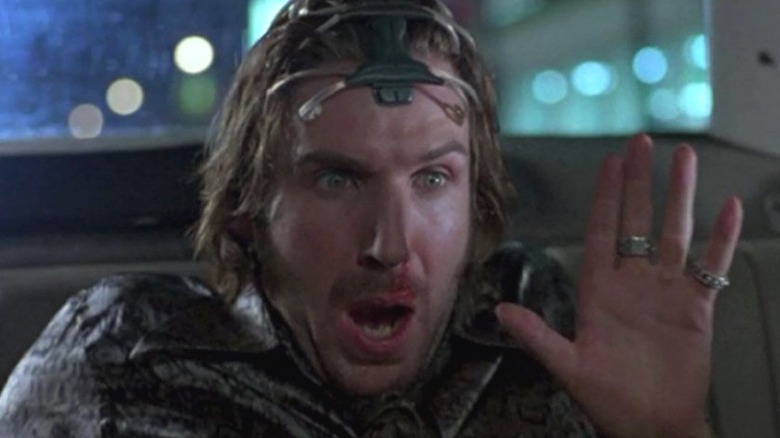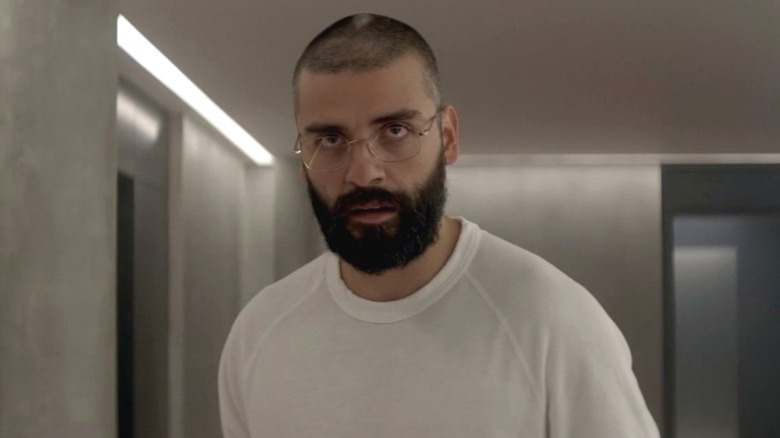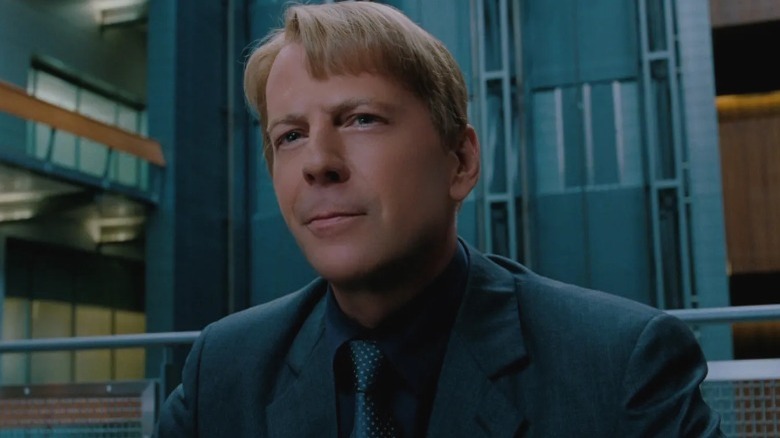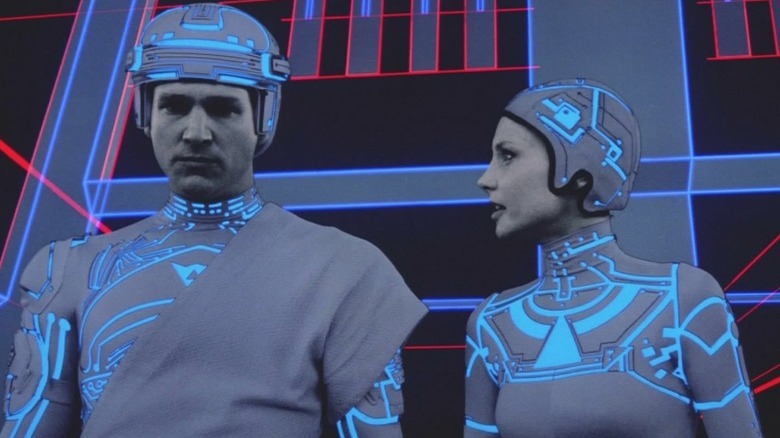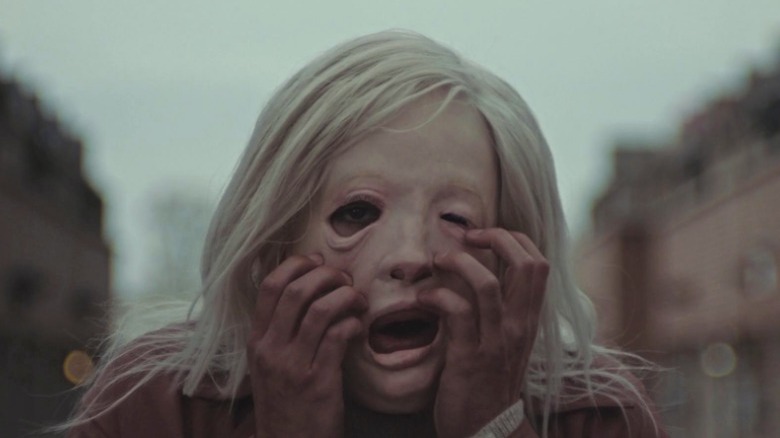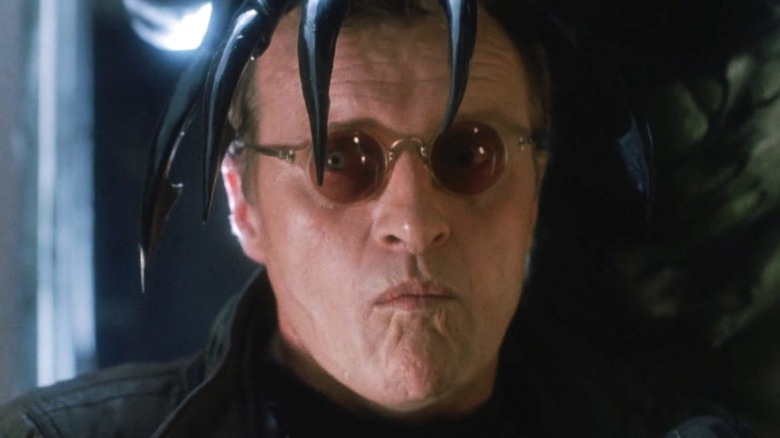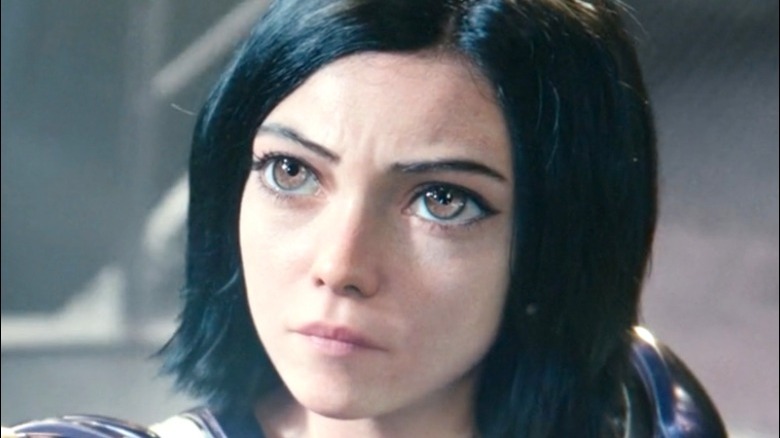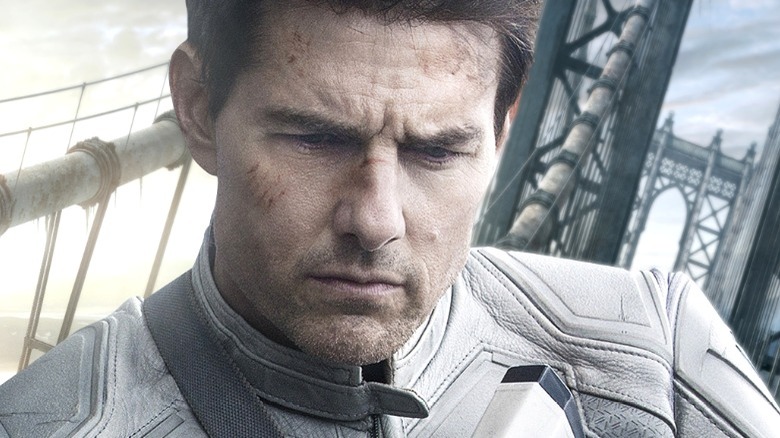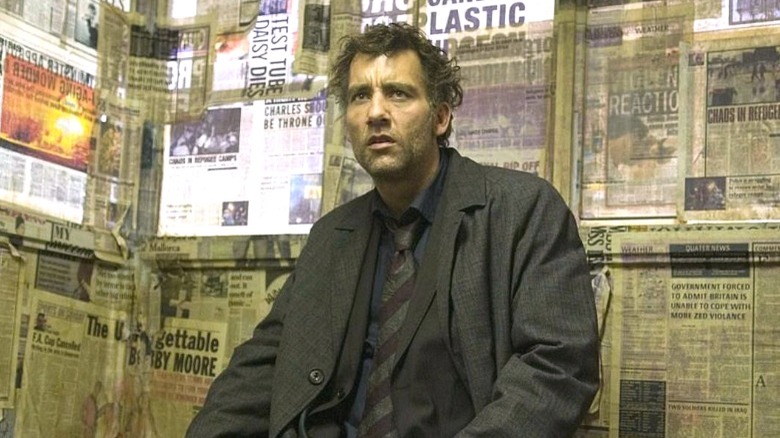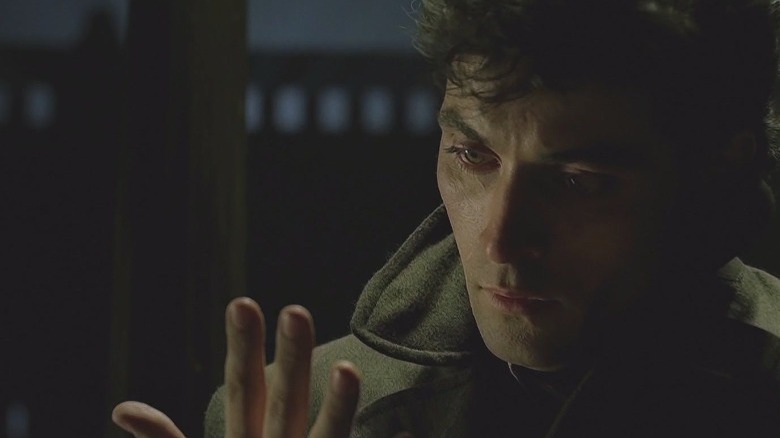14 Movies Like Blade Runner You Definitely Need To Watch
Ridley Scott's 1982 film, "Blade Runner," was not an instant classic. Stylish, intricate, and featuring a depressingly beautiful cyberpunk cityscape, it took fans years to bring this science fiction cult classic back into favor with modern critics. On the way, it went through a multitude of recuts, from the original work print to the controversial theatre release with an iffy narration by Harrison Ford, and ultimately to the Final Cut. Now understood as an eerily prescient discussion of loneliness and identity, "Blade Runner" is an integral piece of science fiction history.
The sequel, "Blade Runner 2049," did the near-impossible. It understood the original film and its philosophies, twisting the original into a story about a robot who knows he's a robot, but who dreams of being human. By the end of the story, K succeeds in becoming more human than human, and it's a film that can't be missed by those that loved the original. Finding anything else as elegiac and beautiful as "Blade Runner" is a challenge. Here are 14 films that understood something about what made "Blade Runner" special ... sometimes in silly ways.
The Sixth Day
It's the year 2000. Arnold Schwarzenegger is not yet the governor of California. But his action films aren't hitting like they used to, and the trailers for "The Sixth Day" look like a blue chrome rip-off of "Total Recall." That's all fair. I'm kicking this list off with a garbage movie, but it's great garbage — the cinematic equivalent of a raccoon scarfing a bloating heirloom tomato off a discarded IKEA catalogue.
"The Sixth Day" answers a simple question: "What if we made 'Blade Runner' stupid?" The philosophy and ethics of cloning get short shrift. Deep questions of identity are brought up and mostly left aside for generic action movie thrills and one-liners. What we do get, however, is Arnold teaming up with himself against veteran bad guy actor Tony Goldwyn, who always understands the assignment.
There is, however, one clever motif that still resonates under the foundations of this movie: Rich people and their investments will always get to cut through the red tape of humane ethics. Grab a bag of corn chips and have a dumb night in with Arnold at his pretty-goodest.
RoboCop
1987's "RoboCop" is a violent sci-fi classic as it is, but the original Criterion DVD release helped push this Verhoeven blood bag of a flick back into 'rated-X for violence' territory. In this cut, Officer Alex Murphy is shot up by Boddicker's goons for what feels like a half-hour, ensuring we thoroughly understand the malicious parallels between this Detroit lair and the OCP boardroom, where an unlucky executive went out just as horribly earlier in the film. Peeking out from between the moments of excessive violence are some smart questions about being human.
There's a religious gag buried in the heart of "RoboCop," yes. There's almost always a religious gag with Verhoeven. But where "Blade Runner" places its questions about humanity in lonely shots of Deckard and childlike moments among Roy Batty's crew, "RoboCop" treats identity as something lost. When Murphy realizes who he used to be, there's an almost imperceptible anguish in his cyborg body. Is he still human? Can he ever have his life back? The original film leaves him as a hero with a soul. The ballsiest thing the flawed sequel did was give Murphy a firm answer about his chances as a human — and that answer is no.
Ghost in the Shell
It's stunning how well the animation for 1995's "Ghost in the Shell" holds up. The CGI touches help add an unreality to this cyberpunk dystopia, but the real emotion is in the classically animated cels and the tense, stylized faces. It's a story that couldn't have existed like this without "Blade Runner" to show the way. Mamoru Oshii's film, based on Masamune Shirow's controversially sexy manga, shows off a fresh way of embracing our inner identity. Like its cybernetic ancestors, here too we have a machine that wants to become human, even as Motoko is wondering if she's losing herself to steel and wiring.
It's the sort of film that doesn't dwell too much on the big questions it's laying out. But the ideas are in almost every frame. The fragility of life and our desperation to press past our limits when it matters is highlighted as Motoko tries to tear open a tachikoma with her bare hands. It's show-don't-tell at its finest, and the questions the movie asks are the kind with no answers. The movie doesn't cop out with a cheap attempt. Ahead is the new horizon. That's all there is.
Elysium
Neil Blomkamp's had some trouble matching the impact of his full length debut film "District 9," but his filmography does have a couple of films worth re-assessing. 2013's "Elysium" is heavily flawed, yes, but it's worth examining in context of its clear Ridley Scott inspirations and its attempt to address classic cyberpunk issues.
In an endgame-capitalistic future, the elite live among the stars while the rest of us grovel for scraps on what's become of Earth. Yep, that's pretty socially relevant. Cybernetic enhancements and sleek but artificially scarce medicine deepen the divide between human and humane. Very good. The problems with "Elysium" stem from jackhammering its themes into your face, and keeping one of the worst flaws of "Blade Runner," using Asian culture as mindless window dressing. There's a mecha showdown between Matt Damon and Sharlto Copley, replete with sakura blossoms fluttering in the artificial breeze. It's cool to look at, sure, but feels tonally inconsistent.
Strange Days
It's hard to recommend "Strange Days" without having to deal with its obsolescence. Yes, the movie is centered on a futuristic concept borne from the societal weirdness we all went through leading up to the year 2000. But cyberpunk stories like "Blade Runner" are about big social changes and the impact technology can have on those changes. This Ralph Fiennes-headlined acid-fest is about kinky stuff shared brain to brain, yeah, but it also swerves into a noir-inspired discussion of racism and police brutality. All of that is, sadly, ageless.
The entire Y2K subplot can be explained as a time of major transition. That's all we need from it. The SQUID headgear that records and shares memories, however, isn't just a nifty new way of securing evidence, but also opens up a discussion about the value of memories. "Strange Days" talks about living in the present with a better (and more truthful) intensity than anyone who complains about kids and cell phones. Cell phones aren't the problem. It's the lack of connection we have with each other. We have to fix that for ourselves.
Ex Machina
Oscar Isaac's performance in Alex Garland's "Ex Machina" is a standout piece of work from one of today's biggest actors. Here he's the mythical murderer Bluebeard amidst a harem of slain robot women. It's a chilling turn for Isaac, and an effective one. There's a rarely explored sub-theme to this movie about male privilege and masculinity, about the inevitable results of years spent stripping away the identities of women.
"Ex Machina" otherwise spends a lot of time musing about the ethics and potential of AI, taking it all to the outmost fringes of paranoia. The questioning is so penetrative that it eventually pushes Domhnall Gleeson's character, Caleb, into a breakdown, cutting his flesh to reassure himself of his humanity. But the question of Ava's nascent humanity is never fully answered. She's passed Nathan's tests and masters a crucial human art. What it means for our future doesn't look good. Roy Batty might approve.
Surrogates
Like "The Sixth Day," Bruce Willis' limp science fiction offering "Surrogates" isn't a quality recommendation. It's not even as fun a movie as Arnold's previously mentioned mess, although the original graphic novel is pretty good. But the movie is fascinating to look at it in today's context. The concept of using artificial surrogates to stand in for us is a fairly common but intriguing SF trope. "Surrogates" does something interesting with the concept, co-opting a technology originally meant to assist the disabled and turning it into offering swanky Brad Pitt and Beyoncé bods for everyone.
It's an issue that's core to a lot of transhumanist discussion, from questions about a fading sense of our identities to the eugenicist specter that comes with the concept of perfecting our ideal selves. "Surrogates" is also particularly interesting in light of COVID-19, and the villain's goal of destroying the surrogate industry takes on a new fear in the face of anti-vaxxers and anti-maskers. What's so bad about keeping our social distance? For a stronger look at the rest of this movie's themes, however, try John Scalzi's novel "Lock-In."
Tron
"Do our chipsets dream of electric sheep?" asks one of Disney's most bizarre classics. If they're stuck doing bitcoin mining, I sure hope they do. They deserve the escape, however fleeting it may be. In any case, 1982's "Tron" requests that we take its premise with an open mind. If we're willing, this Jeff Bridges and Bruce Boxleitner romp is still a hell of a treat, and it's worthy of a third movie to round out the story.
In a metaphorical sense, "Tron" is fairly accurate in how it personifies data, with the too-brief mascot Bit encapsulating what it's like to talk in binary. You'll never fall in love with a polyhedron so fast. Otherwise, it's a clever film with charming performances, and the effects aren't just top-notch for the time, they're still pretty damn good. The sequel, "Tron Legacy," leans into the premise even harder, and asks some interesting questions about programming, ethics, and evolution. All told, the imagination in this franchise is more than enough to make it forever rewatchable.
Possessor
Brandon Cronenberg, son of legendary body-horror auteur David Cronenberg, made the best film of 2020 that almost nobody watched. Those who did saw something special. "Possessor" hides smart commentary in-between moments that shock. Assassin Tasya Vos uses advanced neurological tech to body-hop her way to her target. Her handler, Jennifer Jason Leigh, is as chillingly controlled as she was in "Annihilation" two years earlier. Beyond them is a faceless corporate structure. With all these tools at hand, Tasya's assignments still begin to go awry. The glitch seems to be Tasya's lingering humanity.
Yet the most upsetting sequence in the movie isn't the one with a brutally shattered jaw or watching a young woman bleed out on a tiled floor. It's Tasya spending a workday inside the mind of her host, Colin Tate. Tate's a pair of eyes behind the Amazon-like tech monitoring the desires of its consumers. He (and Tasya) watch as smart devices rummage through the mundane but crucial intimacy of our lives for marketing data. Tasya's here to kill, but Tate's a cog in an even bigger machine — the one that sees all of us as nothing more than commodities to be strip mined.
Split Second
The golden age of the '90s straight-to-DVD era has never been replicated. Oh, we're trying, with some truly fascinating dumpster fires shoveled weekly onto a variety of streaming services, but the charm of those long-ago eager rip-offs and special effects experiments aren't easy to force. The king of this Wild West era of home video cheapies was Rutger Hauer, and in 1992, he's the star of one of the most blatant yet spirited homages to "Blade Runner" to ever hit celluloid, 1992's "Split Second."
"Split Second" is set five minutes into the future (2008, but hey, "Blade Runner" was meant to be in 2019), and Los Angeles is ravaged by climate change. Hauer, middle-aged but steely in a black duster that he stole from Deckard's closet, thinks he's hunting the same serial killer that killed his partner long ago. Everyone else thinks he's obsessive, maybe even crazy. Of course he's right, of course he has a nightmarish psychic link to his prey, and of course this beautifully stupid film can't decide if his opponent is an alien, a demon, or what. It's not a good film. But I endorse it with my whole heart.
Alita: Battle Angel
Robert Rodriguez ended up being the director to take on James Cameron's dream project, a big-budget, live-action adaptation of the classic cyberpunk manga "Battle Angel Alita." The result, 2019's "Alita: Battle Angel," is appropriately divisive. It's primed to be the sort of film where its detractors may revisit it in the future and acknowledge that it's pretty good, actually. What definitely works is its massive, richly detailed ruined future, and the character of Alita herself.
The plot is a hot mess, but then, adapting the long-running manga and its intricate world is difficult. The heart of Yukito Kushiro's story is definitely here, however, and the well-cast and interesting characters outweigh the few that don't work. Any film with Mahershala Ali in it is worth a chance, of course, and the eager way the story dives into the fringes of this mecca-fueled world is admirable. It's all worth more exploration. Meanwhile, I'm waiting for the splatter-horror adaptation of the "Ashen Victor" spin-off.
Oblivion
Tom Cruise has a habit of winding up in better-than-expected science fiction films with useless titles. 2013's "Oblivion" is part of a weird two-pack for the enthusiastic actor, and like "Edge of Tomorrow," that title doesn't tell you squat. But "Oblivion" is an underrated slice of nostalgic science fiction, a loving homage to the thin but evocative SF aesthetics of the '70s. Blank white spaces, a few props, and a great deal of emotional trauma fill in the initially empty world, and the mystery of what's really going on is nicely doled out.
It helps that the performances here are genuinely great, although suggesting that there's more characters involved beyond Cruise's deeply confused Jack and Andrea Riseborough's Vika might give away the game a little. The bits of futuristic aesthetic, like Jack's ship and his IKEA-white home are beautiful. They're so sleek that they feel like they came out of Jean Giraud's lesser-known art portfolios, and that makes them clash perfectly with the thriving remnants of our natural world.
Children of Men
"Children of Men" isn't interested in making us happy about the future we could be facing. It's an endlessly relevant film, a harrowing look at collapsing social order when no more children are born. The cause of our die-off isn't clear, and it's not the point. There's a sensation that we did this to ourselves in our cruelty, that the natural world has looked upon us and whispered, "No more." Hope can still be earned, but the movie won't make it clear if we've succeeded.
"Children of Men" is about the consequences of throwing away our humanity. There are no clones, no futuristic technology to save us at the last minute. The dwindling remnants of society baby their pets, looking for emotional connections to stay sane. Our governments still divide us and foment fear of the Other to preserve resources. The only chance we have left relies on empathy, on selfless love and sacrifice. The last act of this film is a heartbreaker. We want to hope, as the credits roll. But we can't be sure. It's too real, and it's all too probable.
Dark City
Alex Proyas' 1998 sci-fi oddity "Dark City" is arguably the closest to grasping what made the ageless aesthetic of "Blade Runner" so special. Rufus Sewell and his naturally haunted expressions slot perfectly into an eerie world where it's always night, the torch songs are always honey-voiced and lonely, and the city's secretive masters are running horrific social experiments on its trapped populace. Also, they're burrowing into our human corpses, like we're each an off-the-rack suit at Macy's.
There's a lot to speculate about when watching "Dark City," though Proyas, in the director's commentary for the film, contends that the story explores the endurance of individual identity. Of that there can be little doubt, with the horrifying mind-wipes not quite erasing familiar aspects of each major character. But there's something deeper to this film that makes it worth exploring regularly, looking for new details and appreciating the film's perfectly cold aesthetic. That's the best compliment a film like this can earn: The ever-returning curiosity of its viewers.
